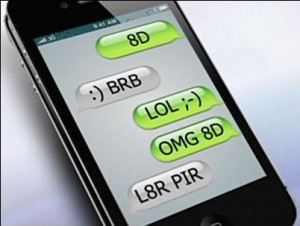The Masters of Communications Program at the Annenberg School for Journalism and Communications at the University of Southern California focuses on teaching its students how organizations and people communicate. Language is the basis of communications and language is consistently evolving. The first type of language was most likely a type of sign language established by cavemen. As each generation of people evolve, the language that they speak progresses, and the pronouncements and the meanings of the words used in their language change based upon the current society and circumstances (Liberman 2011, para 4.). But how has modern day language been influenced through the use of social media?
In the early days of the internet was the introduction of the email message and, a major fear was that the email message would replace and or destroy the act of written correspondence or letter writing (Sherman, 2010, para. 3). But, this was not the case, just as email was looked upon to change the way society conveys written messages. Today social media has had an impact on the way the written word is used and understood (Sherman, 2010, para. 5).
The use of the written word has evolved with the use of social media in many different ways. One way is text speak. Text speak uses different spellings and abbreviations for words. This language change has been highlighted by the media in recent years and the use of these abbreviations or text speak to communicate may be somewhat overblown. Text Speak is the use of vowel-free abbreviations and acronyms usually in short message with a character limit such as a “tweet “or a “SMS” message (Kleinman, 2010, para.30). Many people believe that text speak is new language but, on average when people send text message only 10% of the words in an average text message are not spelled out completely (Kleinman, 2010, para.31).
Another language phenomenon that occurred because of social media is the way technology has changed the definitions of existing words to mean something else. An example of this is the term wireless in the 1950’s the word meant a short-wave radio. (Kleinman, 2010, para.40). Today, the word means a type of communication and computing devices. (Kleinman, 2010, para.41).
According to David Crystal , honorary professor of linguistics at the University of Bangor, historically language takes many generations to change but, the internet as speed up this process so, now people notice this change much more quickly (Kleinman, 2010, para.45). People are using word play on the internet to manipulate language. (Kleinman, 2010, para.51). The manipulation of language or word play on the internet is becoming a skill similarly to that of tagging or skateboarding (Kleinman, 2010, para.45). It will be interesting to see how the use of language will change on the internet in the next 20 years.
–Vicki Young
CMGT 541-C
References
Kleinman, Z. (2010, August 16). How the internet is changing language
BBC.co.uk. Retrieved from http://www.bbc.co.uk/news/technology-10971949
Liberman, M. (2011) Linguistics 001: introduction to linguistics. University of Pennsylvania.
Retrieved from: http://www.ling.upenn.edu/courses/ling001/
Sherman, A. (2010, April 28). How social media is affecting the way we speak and write
Gigaom.com. Retrieved from: http://gigaom.com/2010/04/28/how-social-media-is-affecting-the-way-we-speak-and-write/


15 Responses to Do you speak with a “Social Accent”?